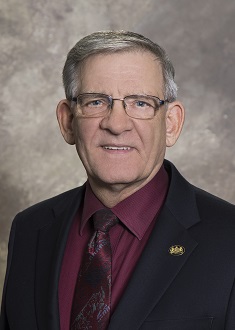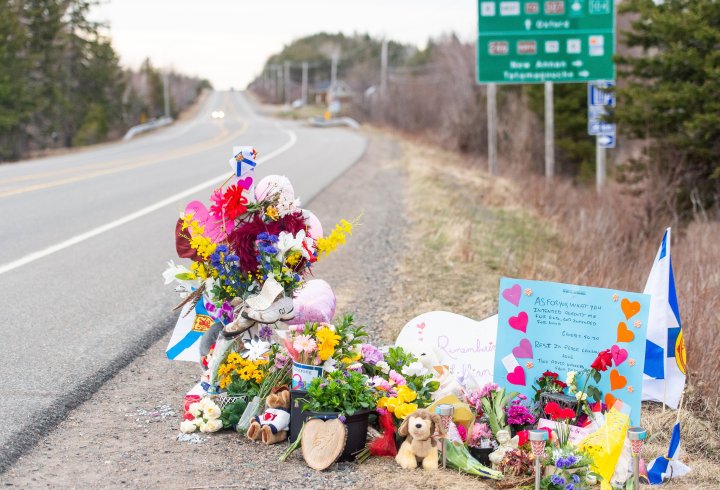By
Sarah Ritchie ,
Alex Kress &
Brian Hill
Global News
Published January 4, 2021
8 min read

Late in the evening of Saturday, April 18, 2020, a gunman embarked upon one of the deadliest killing sprees in modern Canadian history.
Thirteen hours later it was over, leaving scars on the rural community of Portapique, N.S., the province and the entire country.
Click here to listen to episodes of 13 Hours: Inside the Nova Scotia Massacre
Twenty-two people lost their lives that weekend. Many more people lost someone they loved.
In Episode 6 of 13 Hours: Communication Breakdown, we explore what the RCMP did and didn’t do to get help from local law enforcement and the military when searching for the gunman.
At 12 a.m. on April 19, the Truro Police Department received a phone call from the local emergency room, informing them that the hospital was in lockdown.
The caller told police that one of their patients was shot in Portapique — a rural community about 45 kilometres away — and that paramedics believed the shooter was still on the loose.
The police dispatcher said they were unaware of the shooting and transferred the call to an officer who said he had “heard” about the situation.
Nearly an hour later, at 12:55 a.m., the RCMP called Truro police and asked them to “be on the lookout” for suspect Gabriel Wortman, the gunman, who they considered “very armed and dangerous.”
Copy of Truro Police Department call log from April 19, 2020
By 1 a.m. on April 19, RCMP officers had been on scene in Portapique for more than two and a half hours. They’d discovered the bodies of at least four people who were killed by the gunman, plus the remains of several homes and vehicles that were torched.
This phone call, and a bulletin that followed at 1:07 a.m., were the first official notices sent by the RCMP to Truro police. Neither mentioned the carnage that had unfolded in Portapique.
“It just blows my mind why the police departments in Amherst and Truro were not contacted,” said Mike Gregory, a retired RCMP officer and Colchester municipal councillor.

RCMP Supt. Darren Campbell said information about the suspect and the killing spree was communicated to all Nova Scotia police agencies “as it became known.” Campbell also said other police forces were asked to assist “in a variety of ways” during the killing spree. This included other police agencies taking service calls in RCMP jurisdictions while the RCMP continued to search for the gunman.
The RCMP has not, however, explained why it didn’t do more to involve local police forces in the province for help in the search for the gunman.
Truro police Sgt. Rick Hickox, who was working during the early morning hours of April 19, would later write that he had “very little information” about the severity of the shooting spree and the possible whereabouts of the gunman.
He said that by 6 a.m. Truro police knew there was an active shooter, that there were “at least four casualties” and that several homes in the Portapique area were on fire.
“There was some suggestion that the shooter may have left the area, but nothing was confirmed or relayed to state that this was a plausible fact,” he wrote.
April 2020 wasn’t the first time the gunman was investigated by police.
In 2001, the gunman assaulted a 15-year-old boy outside his denture clinic in Dartmouth, N.S. The violent attack resulted in the boy being hospitalized.
The gunman pleaded guilty to assault in January 2002 and was given a conditional discharge and nine months probation, plus a $50 fine.
In 2010, Halifax Regional Police investigated the gunman after someone told police he threatened to kill his parents. Police said they determined there wasn’t enough evidence to lay charges or get search warrants in that case.
Then, in 2011, Truro police received a tip from an unnamed person who said the gunman wanted to “kill a cop” because he was upset with how police handled a break and enter investigation three years earlier.
The tip, which was passed on to Nova Scotia’s Criminal Intelligence Service, included information that the gunman owned several weapons, including a handgun and long-barrel rifles, which he kept at his cottage, and that he may have been experiencing mental health issues.
This tip resulted in an Officer Safety Bulletin being sent by the Criminal Intelligence Service to all police forces in the province.
According to the RCMP, Halifax police followed up on the tip and informed the RCMP about information related to the gunman’s cottage in Portapique, which is where the tip said the gunman kept some of his weapons.
But the RCMP can’t say what it did with this information and whether the tip about the weapons was investigated. That’s because the 2011 Officer Safety Bulletin was “purged” from their records, according to Cpl. Jennifer Clarke.
“The RCMP has a retention policy on bulletins. We keep them for about two years and this bulletin would be treated the same way. So after two years, the information was purged from our system,” Clarke said during a May 29 interview.
Clarke also said this type of bulletin is “not out of the ordinary” and that the RCMP “routinely” receives notices with this kind of information.
But Gregory, the retired RCMP officer, says there’s nothing routine about a tip saying someone wants to “kill a cop.”
“They should have looked into it,” he said.
“It’s pathetic. You don’t have to be a rocket scientist to figure that one out. Any police officer that had any kind of experience and knowledge in criminal activity, you know you had to, you have to, deal with this.”
Garry Clement, the former director of the RCMP’s Proceeds of Crime Unit, also says the tip should have been investigated thoroughly. He said if he had received that tip the first thing he would have done is a risk assessment to determine if the suspect had the means to carry out the threat.
Clement said a bulletin containing a tip about someone allegedly wanting to kill a cop and who may own weapons should not have been purged from the RCMP’s records.
“I can say if I was the commander and managing it, there would have been a file open that definitely would have happened,” he said. “It would have been either investigated and run to the ground, that it was not viable, or it would have been resulting in an arrest.”
On April 18 and 19, the weekend the killing spree occurred, the RCMP said its only Atlantic-based helicopter was undergoing routine maintenance.
Global News asked the RCMP if it had any plans to temporarily replace the helicopter, stationed in Moncton, N.B., the weekend the killings occurred. The RCMP did not answer this question directly.
“RCMP Air Service assets undergo routine maintenance as per Transport Canada regulations and standards, which was ongoing at the time of the incident,” RCMP spokesperson Cpl. Caroline Duval said in a written statement.
“In the event that a need arises, local RCMP can seek support from other divisions/provinces or other agencies to assist, based on the specific needs of the situation at hand.”
Global News also learned the RCMP did not ask the military for help in the manhunt for the gunman, even though two Canadian Armed Forces bases are located within 150 kilometres of Portapique, both equipped with helicopters capable of conducting search and rescue missions.
“No. The Canadian Armed Forces were not asked by (Nova Scotia) or the RCMP to provide aerial support regarding the events Portapique,” said a written statement from the Department of National Defence sent on Oct. 19.
Meanwhile, Campbell said during an April 24 press conference that a “request” for air support was made as part of the RCMP’s critical incident response to the killing spree. The RCMP has not provided details about what time this request was made or when a helicopter was deployed.
The Nova Scotia Department of Lands and Forestry, which provided a helicopter to assist in the manhunt, also declined to provide specific details about what time its helicopter was deployed and what capabilities it had.
“Please contact the RCMP for information about their investigation,” a spokesperson for Lands and Forestry said in an Oct. 6 email.
Allegations about the police use of a helicopter during the manhunt for the gunman were also included in a proposed class-action lawsuit filed by families of the victims against the RCMP and province of Nova Scotia.
The suit alleges that the RCMP did not use a helicopter capable of searching during the nighttime or in the wooded areas surrounding Portapique, and that if such a helicopter was used, it was not used in a timely manner or a manner likely to locate the gunman.
The lawsuit has not yet been certified by the court and neither the RCMP nor the province has submitted a defence.
To subscribe and listen to this and other episodes of 13 Hours: Inside the Nova Scotia Massacre for free, click here.













Comments